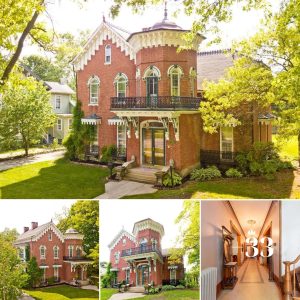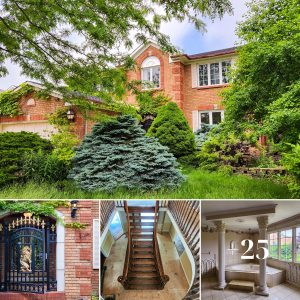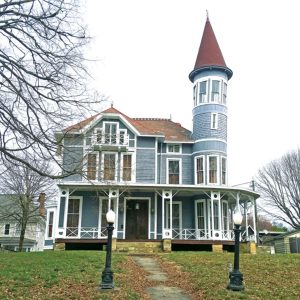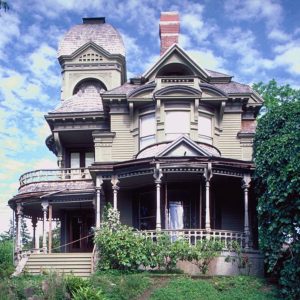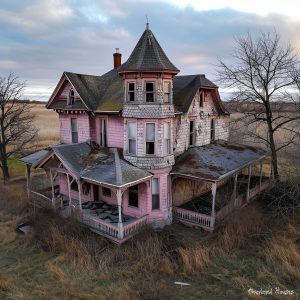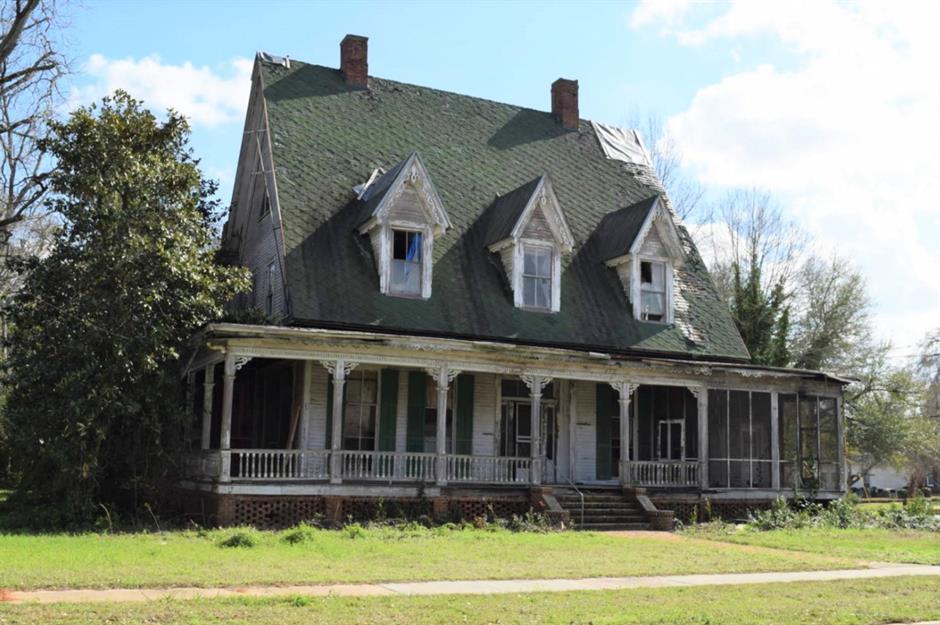
Built in the late 19th century and abandoned for decades, the Little House was a beloved local landmark in Louisville, Georgia. The property held a treasure trove of curios and personal belongings from the lives of its former owners, stretching back some 148 years. Tragically, the battle to save this enchanting property was lost when a freak act of nature destroyed it for good – mere months after renovation work had begun.
Click or scroll on to take a final tour of this incredible time-warp home before it was burned to the ground…
A family home
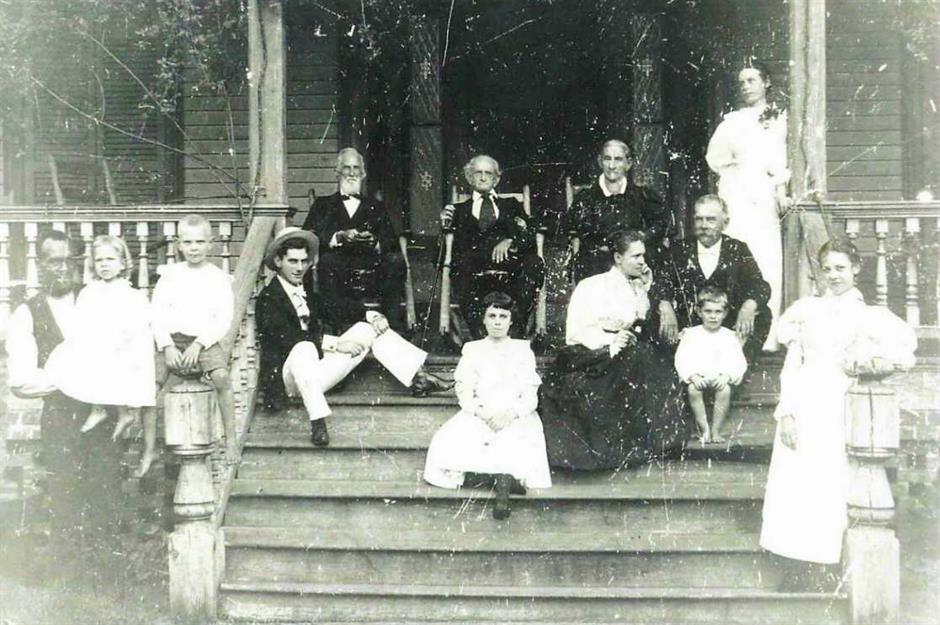
The Georgia Trust for Historic Preservation
In 1875, a wealthy merchant named James Cain Little purchased a large plot of land in Louisville. The following year, Little is said to have paid the $4,000 to build a four-bedroom house on the land, the equivalent of around $116,700 (£92.9k) in today’s money. Little is pictured here on the property’s front steps in the late 1800s.
Before his death in 1917, Little sold the house to his wife Nellie and the property stayed in the family until the 1920s.
Faded Southern belle
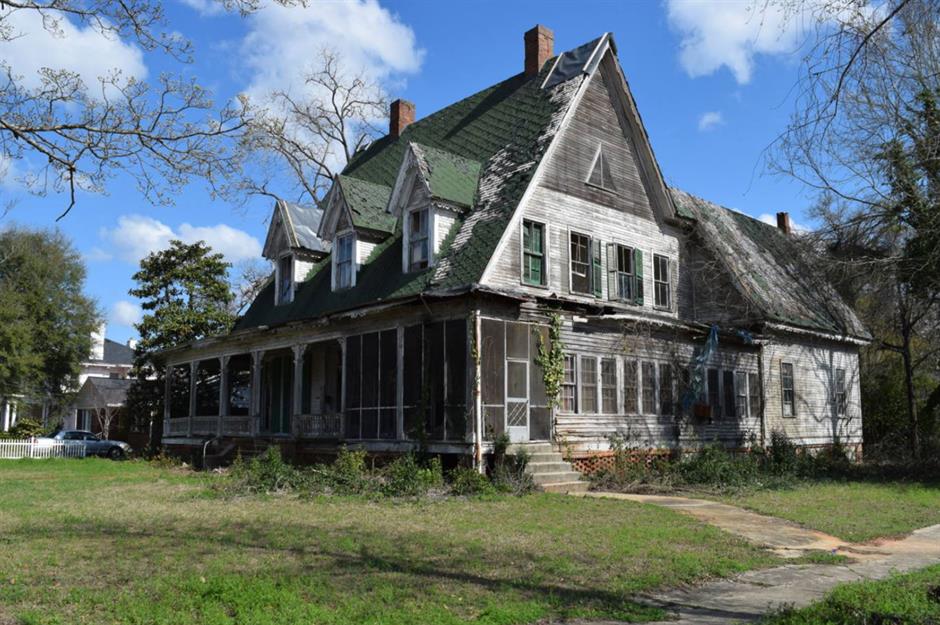
The Georgia Trust for Historic Preservation
Sprawling across 4,500 square feet and featuring 15-foot ceilings, floor-to-ceiling windows and pine floors, the villa was once one of the grandest buildings in Louisville at the time.
Fast-forward a century and a half and James Little’s house sadly lay in ruin, ravaged by time and years of neglect. A prime example of Carpenter Gothic architecture, it’s not hard to see how impressive this structure would’ve been back in its heyday.
Reclaimed by nature
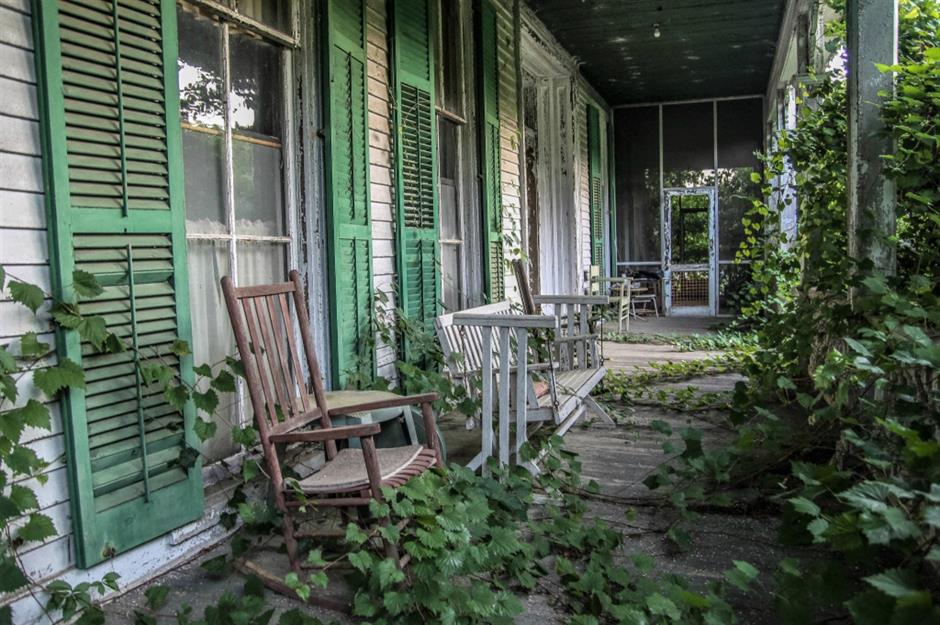
Photographed here by photographer Leland Kent of Abandoned Southeast, the once-imposing white clapboard façade with its striking green shutters needed serious attention when he visited the property in 2016.
The wraparound porch was slowly being reclaimed by nature, as creepers and trailers snaked their way across the deck. A rocking chair creaked in the wind, a reminder of the generations of owners who had paced the boards of the veranda over the years.
Keeping vigil
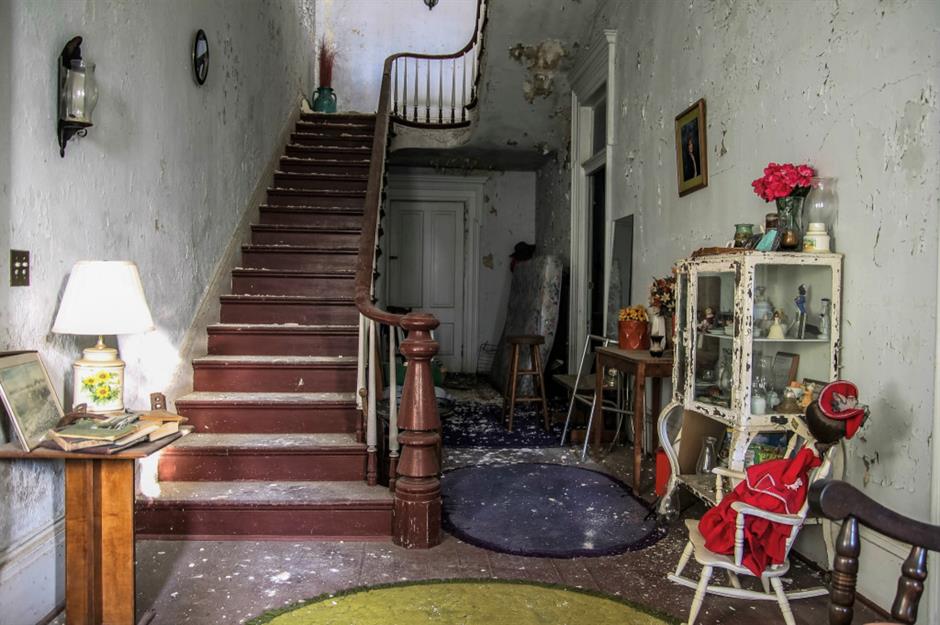
Stepping through the imposing wooden door with its etched glass surround was like taking a trip back in time. The extent of the building’s decline was all too apparent; plaster flakes covered the floors and paint peeled off every surface. To the right of the entrance, a doll in a cherry-red dress kept a silent vigil over the house.
Time-worn kitchen
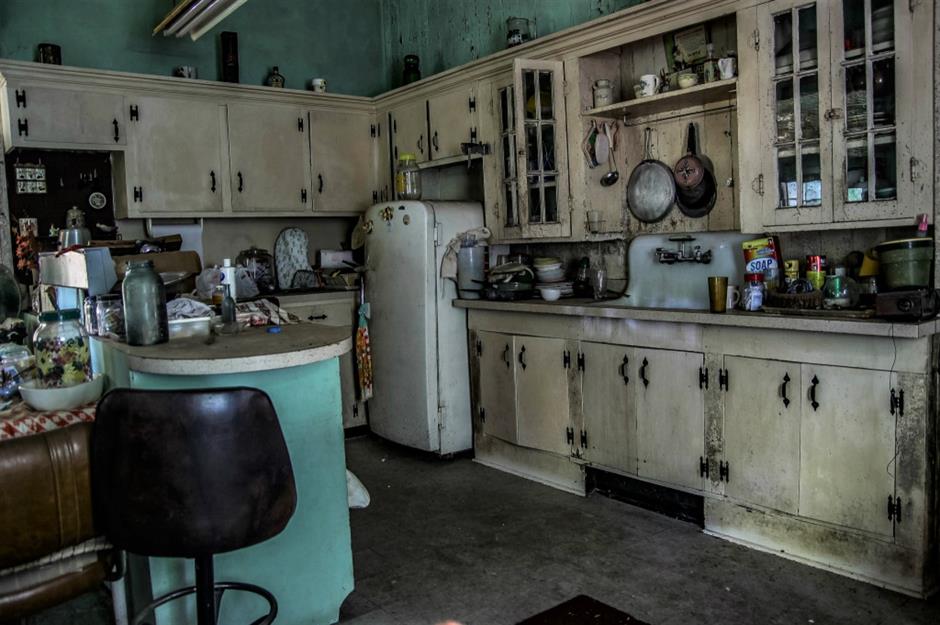
At the rear of the property sat an expansive kitchen, complete with a curved breakfast bar and a vintage refrigerator.
It was almost as if the home was abandoned in the middle of dinner; piles of dirty dishes still lay on the countertops and a cabinet door hung slightly ajar. We can only speculate as to what caused the last occupants to vacate so abruptly.
A house of dolls
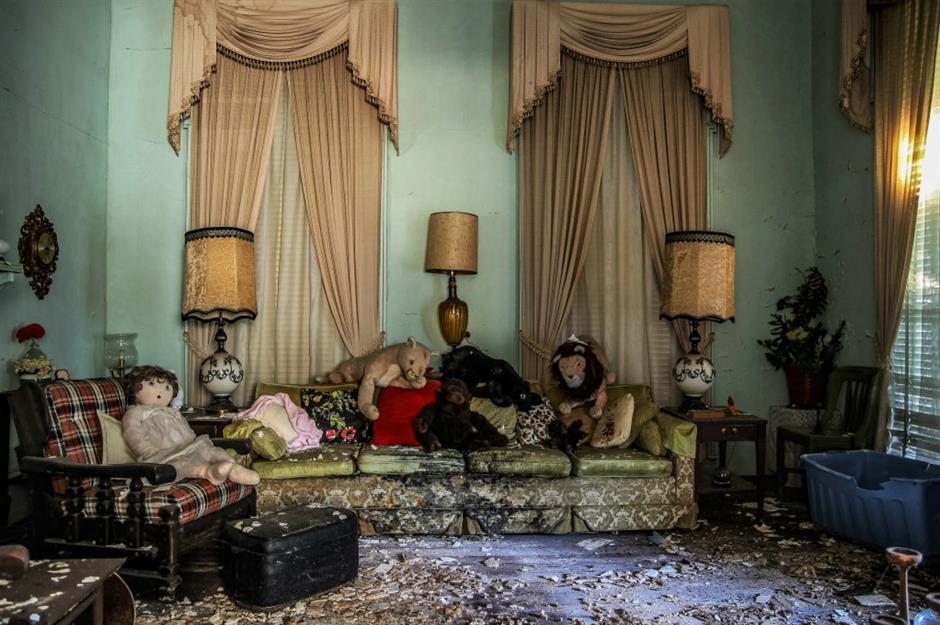
Before it was sadly lost for good, the property was packed with old dolls, stuffed animals, clothes and pieces of furniture left by past owners.
In these images, the once-grand living room with its floor-to-ceiling windows, draped pelmets and green brocade sofa still contained vestiges of its former grandeur, only betrayed by the plaster that littered the floor.
Vintage entertainment
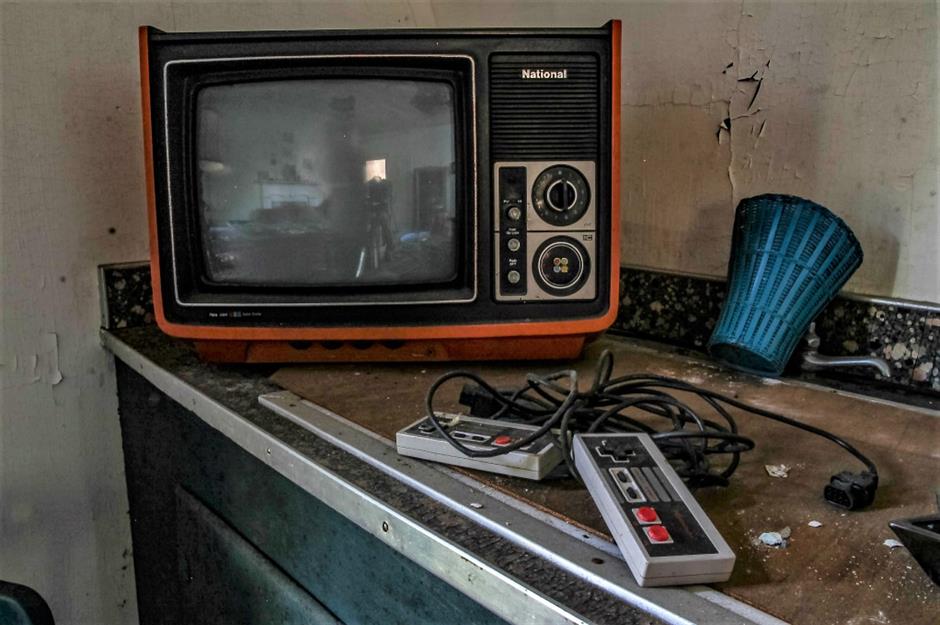
The furnishings left behind offered an intriguing insight into the lives of the Little House’s previous residents.
On top of one cabinet sat this antique Panasonic television set and a pair of Nintendo controllers. The Japanese electronics company successfully ventured into the world of gaming, releasing its first console in the 1980s and becoming a household name. These vintage NES controllers date back to 1985.
Period features
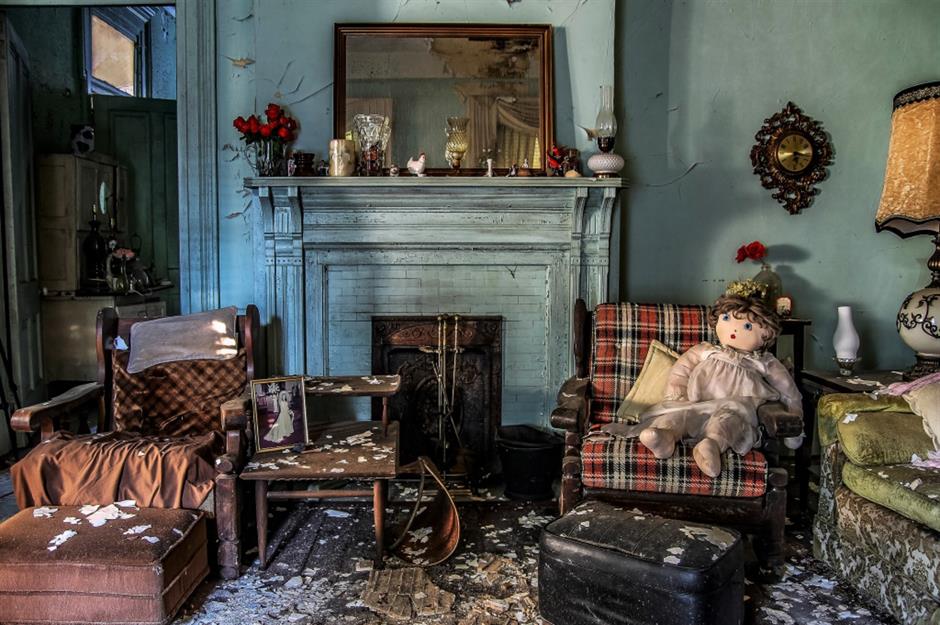
Prior to its destruction, many of the property’s original features remained, including this gorgeous 19th-century fireplace. The mantel was home to an array of trinkets, once prized by the home’s former owners. On the table by the hearth, a mysterious photograph of a woman in a wedding dress hinted at the many tales and secrets held within the building’s four walls.
Making music
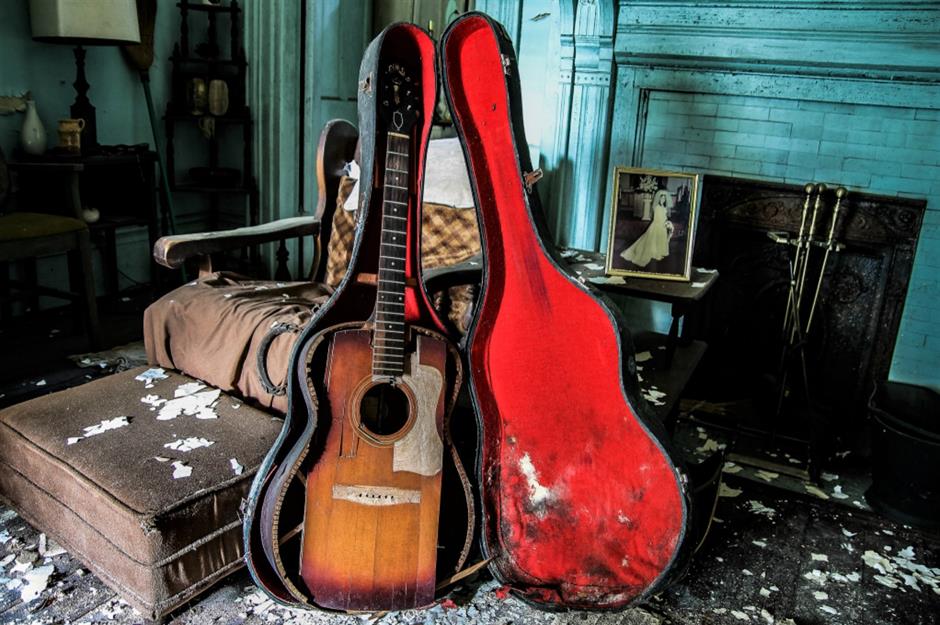
This battered Guild guitar in a felt-lined case was one of the many enigmatic items found in the time-warp home. Though it had seen better days, the instrument would have been worth a pretty penny 40 or so years ago.
Coveted by artists such as Brian May and Jimi Hendrix, the Guild Guitar Company has been a beloved music brand since its launch in 1952. We can just imagine the songs strummed by the fireside here over the years.
A window to the past
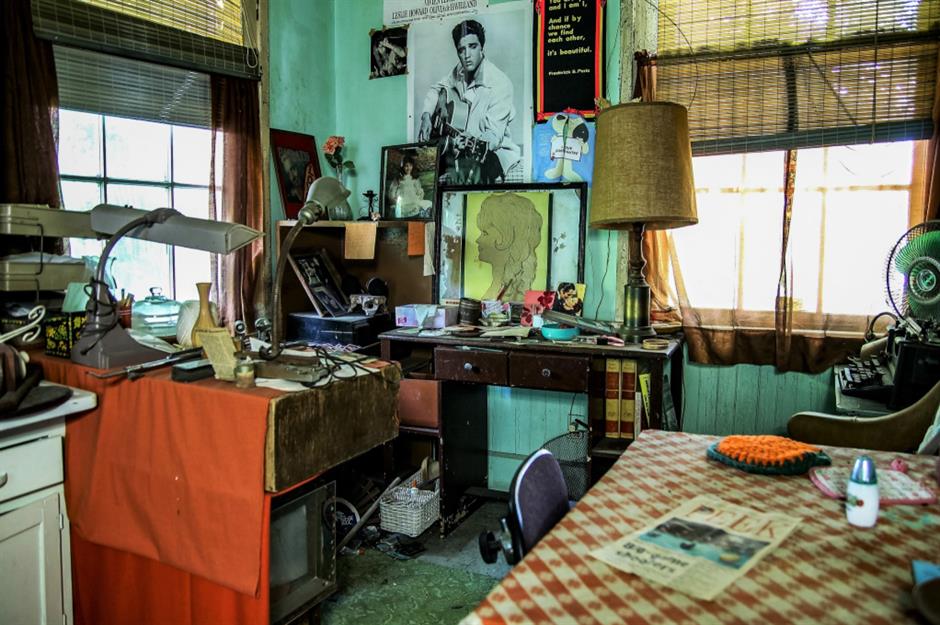
The last owner of the Little House was Ms Eve Griffin, a regular fixture on the lounge music circuit in the 60s and 70s. Items such as the black and white Elvis poster pictured here highlighted her love of music and her successful singing career.
Eve purchased the property in 1987 for the sum of $30,000, the equivalent of around $82,400 (£64.6k) in modern money.
Love letters and literature

In the same room, an old typewriter once sat on the desk by the window. Royal models similar to this one are valuable collectors’ items and can be worth thousands. We can only wonder what the machine was used for; perhaps composing letters to a love interest or making a first foray into novel writing.
Time-capsule bedroom
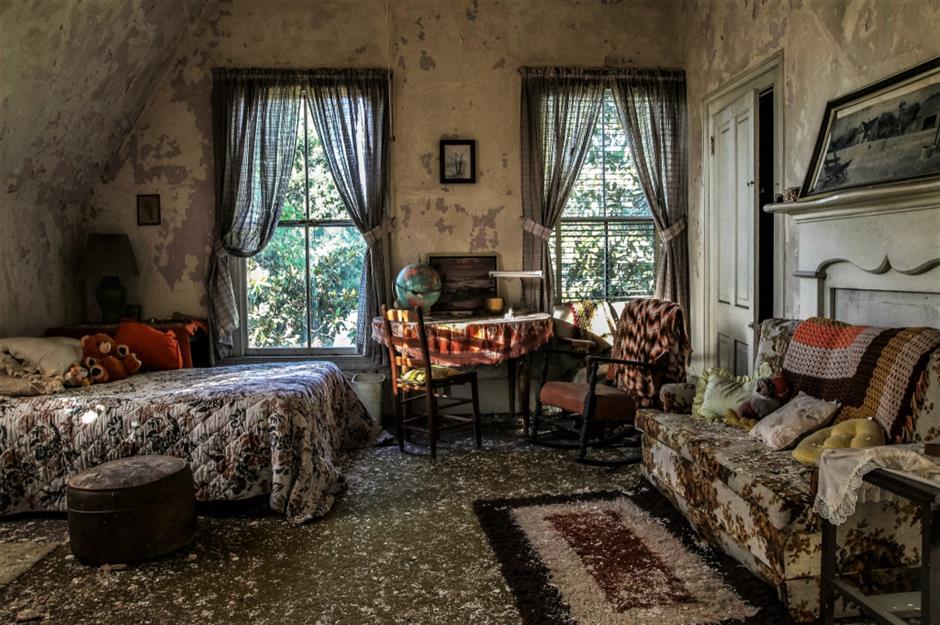
In the master bedroom on the first floor, sunlight filtered through the blinds and cast a golden glow on the paint-flecked carpet. The room was a perfect 70s time capsule. The shaggy rug and orange-brown accents were characteristic of the decade’s retro design trends.
A globe on the table by the window suggested something of the former occupant’s sense of adventure.
Mementos of the past
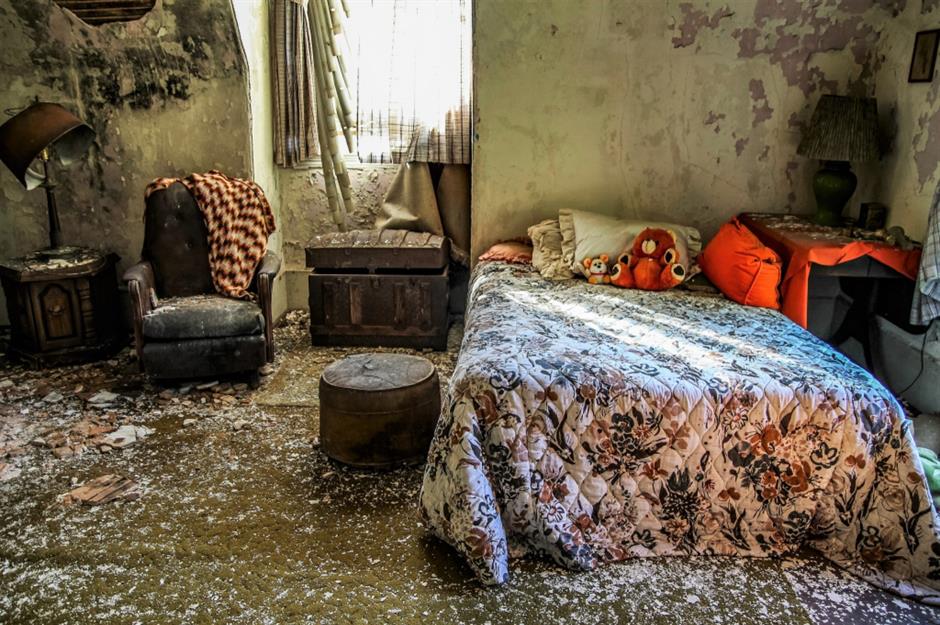
Once clearly a meticulously decorated and homely space, years of vacancy had left the bedroom with a severe damp problem. The plaster had flaked away from the walls, leaving the home’s structure exposed in places.
Though no one had used the room in decades, the bed was still carefully laid with a floral quilt and two orange teddy bears.
Mystery occupants
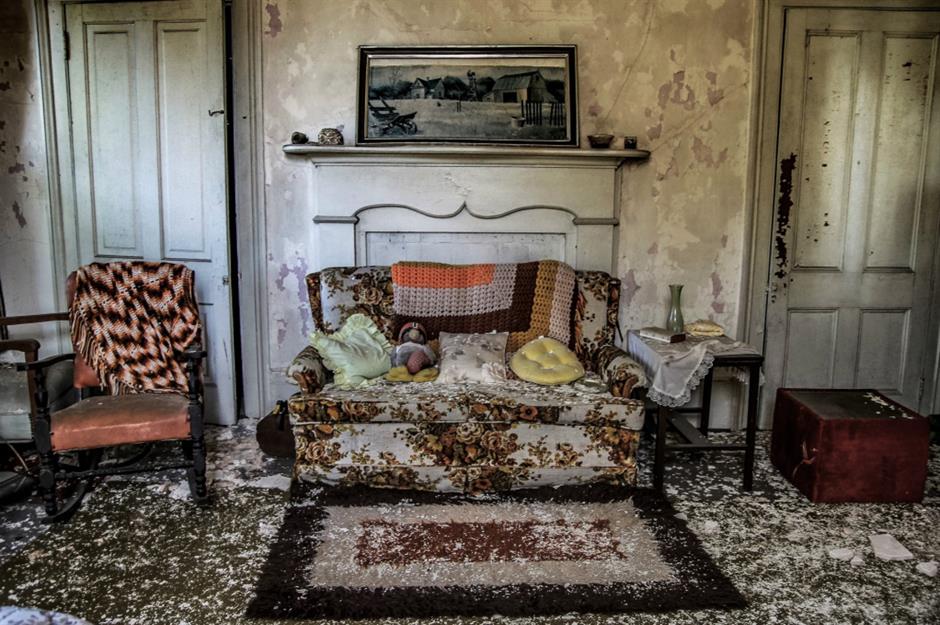
On the other side of the room, a chintzy two-seater sofa partially concealed the fireplace behind. What looked to be a hand-knitted blanket was draped over the sofa back, while a stuffed football mascot was nestled among the upholstery – perhaps reflective of the interests of the last owners.
A mountain of memories
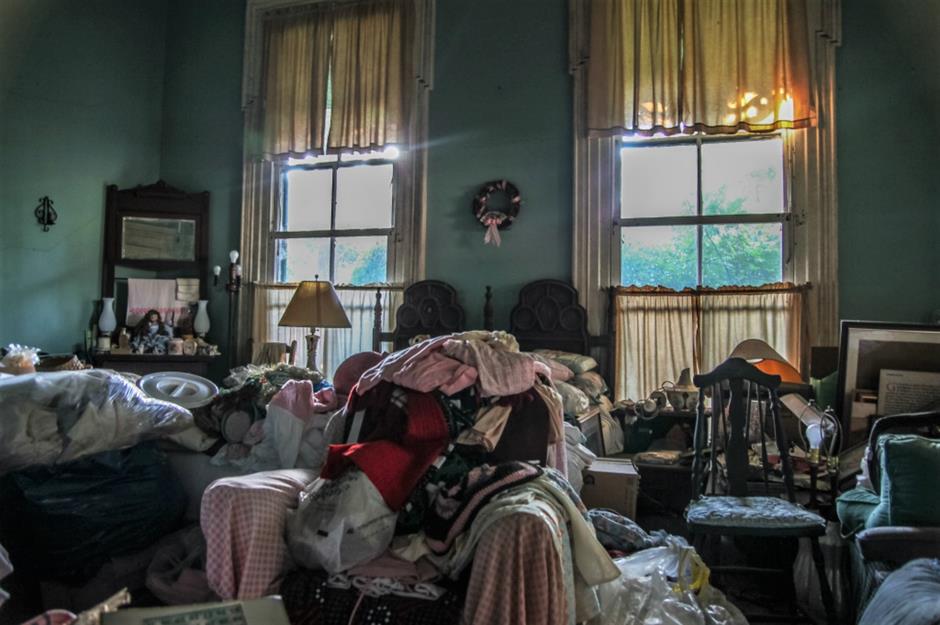
In the front downstairs bedroom, piles of clothing, blankets and bric-a-brac almost completely camouflaged the floor – mementos of the lives that had passed through the property.
Who knows what valuable ornaments or remnants from yesteryear might have been hidden under the mountains of debris?
Antique accessories
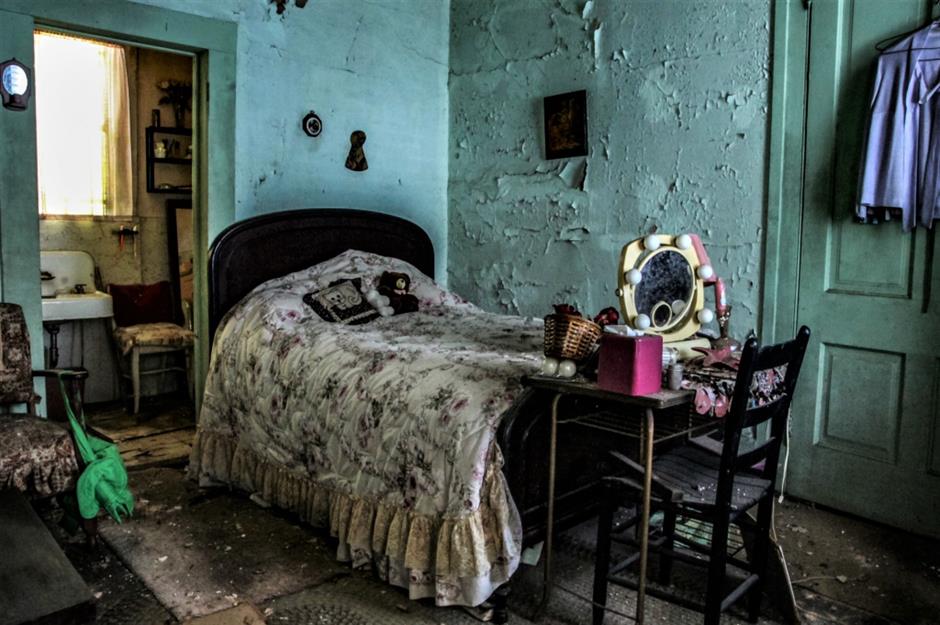
Another downstairs bedroom had a distinctly elegant feel, despite the peeling blue-green walls and exposed floors. The bed was dressed with a frilly floral quilt and a Hollywood-esque mirror was perched at its foot.
The open door led to an ensuite bathroom containing the suite’s original wall-mounted sink and brass hardware.
A childhood long gone
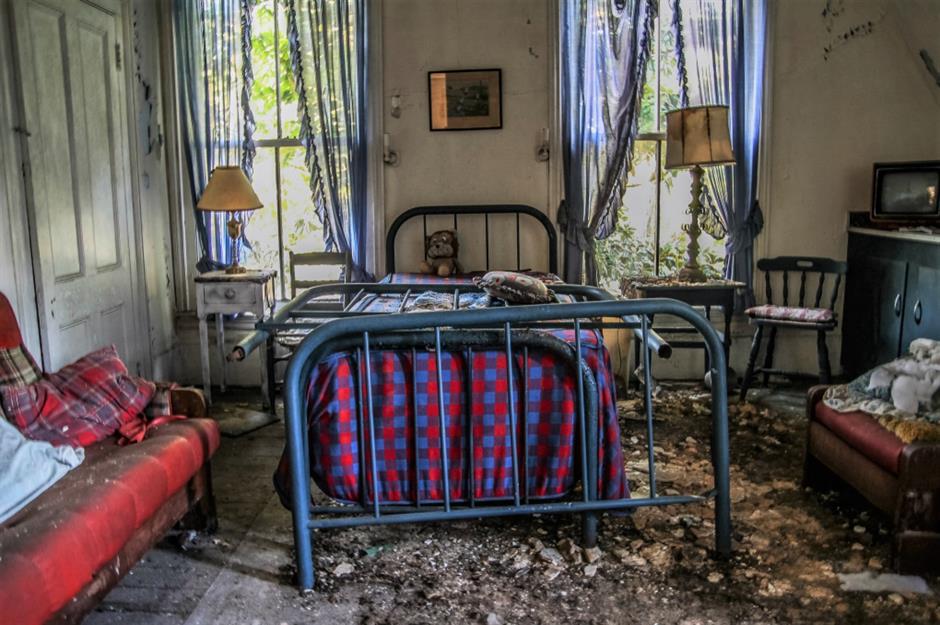
This former children’s bedroom had suffered some of the worst damage in the house, with a large hole in the ceiling and a pile of rubble scattered across the floor.
At one point, the room would have had twin beds, but when Kent visited the property, the frame of the second bed was resting haphazardly on the remaining mattress. With its occupants long grown up, the space had a rather melancholic feel.
An enigmatic history
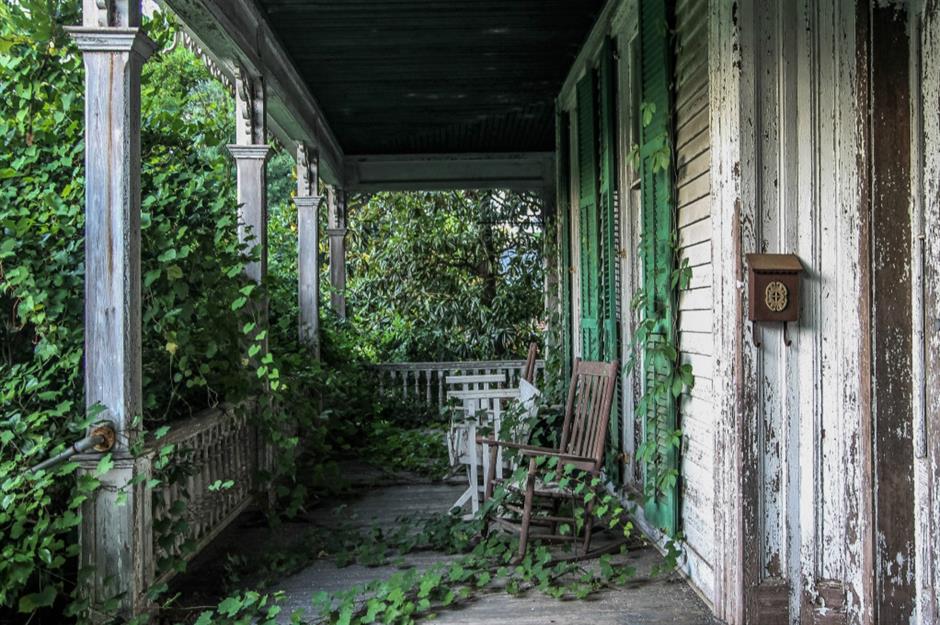
This intriguing property had seen many faces pass across its threshold throughout the years. In the 1950s, several of the downstairs rooms were rented out and used as a boarding house, while the right-hand porch purportedly served as a beauty salon for a brief time.
Following Kent’s visit to the villa, it was sadly cleared of all of the intriguing personal items and curios that rendered it so mysterious.
In 2017, the Louisville Downtown Development Authority acquired control of the building, aiming to stabilise it to prevent catastrophic disintegration in the coming years.
The start of a new chapter?
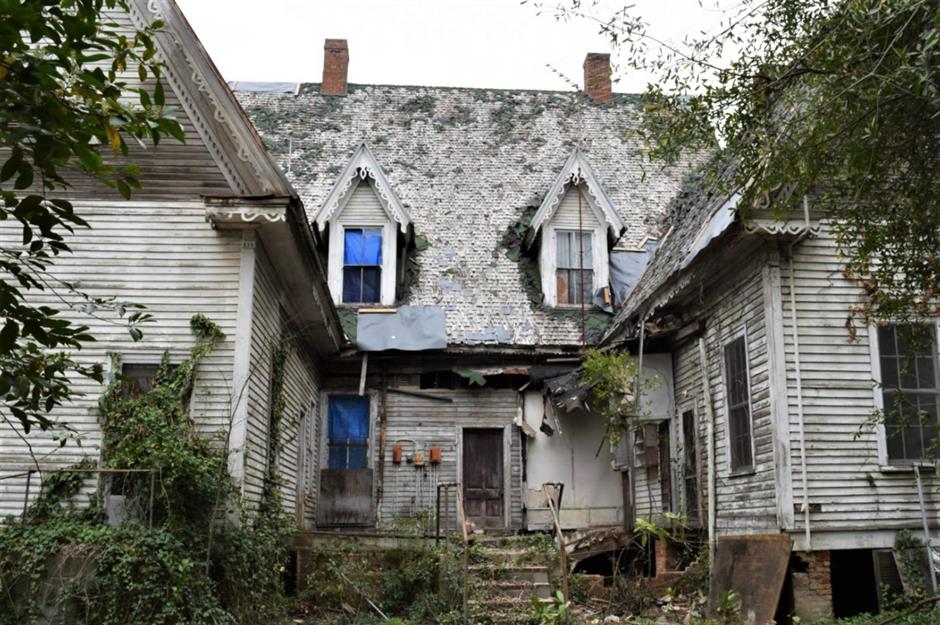
The Georgia Trust for Historic Preservation
The house was placed in the Georgia Trust for Historic Preservation’s Revolving Fund, a programme designed to help save endangered historic buildings by finding buyers to renovate them.
It seemed that there was light finally at the end of the tunnel for this forlorn landmark when the house was purchased by passionate restorationists Laine and Kevin Berry in April 2020. The couple has more than 20 years of experience renovating old homes and they count this Victorian fixer-upper in Arkansas among their success stories. They planned to rehabilitate the Little House and transform it into a bed and breakfast.
Lighting strikes

The Georgia Trust for Historic Preservation
Sadly, just four months after the Berrys got the keys to their new project, disaster struck when a tree outside the property was struck by lightning in July 2020. A fire ensued and quickly spread to the house, engulfing the entire structure. It was reportedly reduced to ash in a matter of hours.
A heartbreaking loss, the tragic fate of the beloved Little House was mourned by preservationists and the local community across Louisville. While the landmark is sadly no more, its fascinating history will live on in Georgia and beyond.
